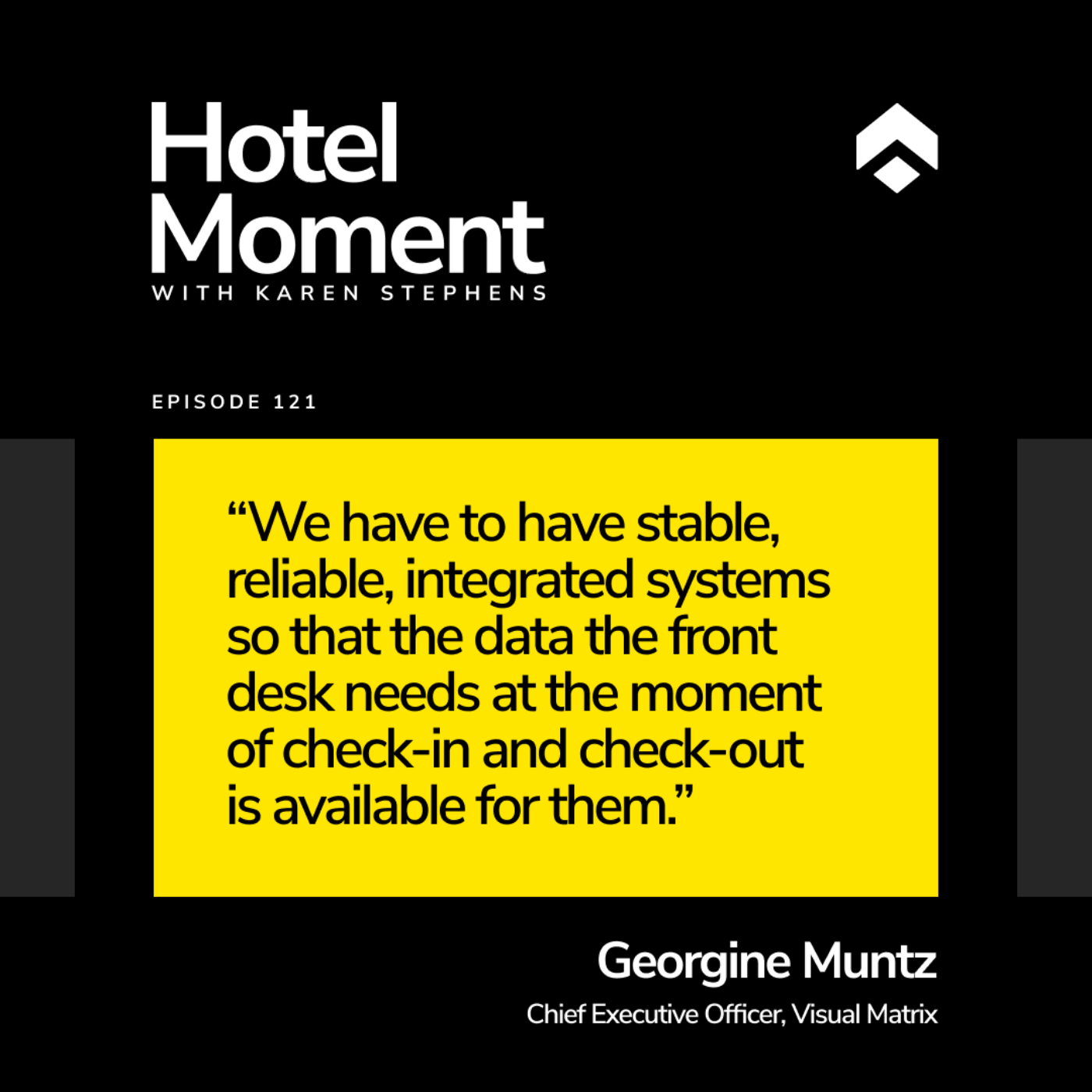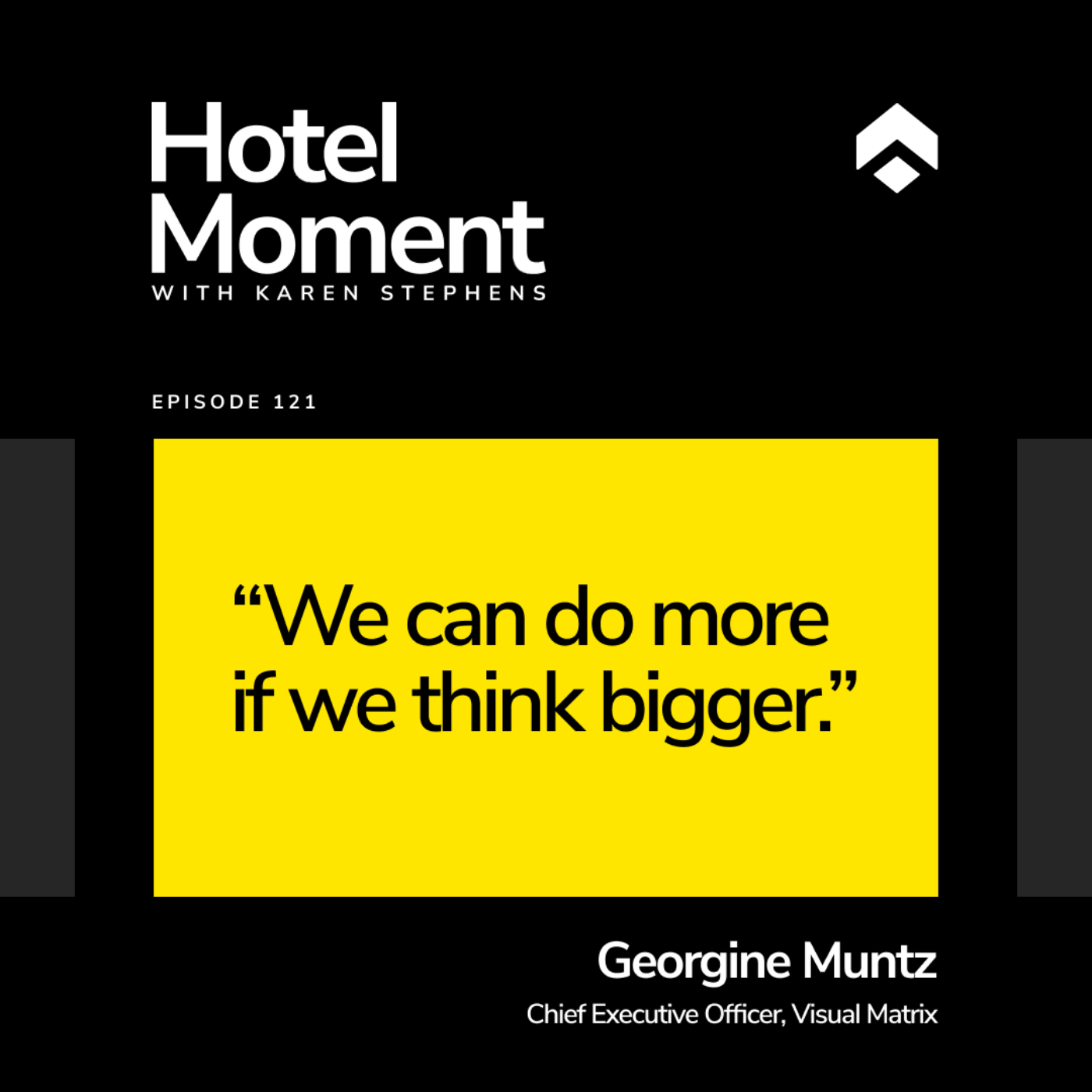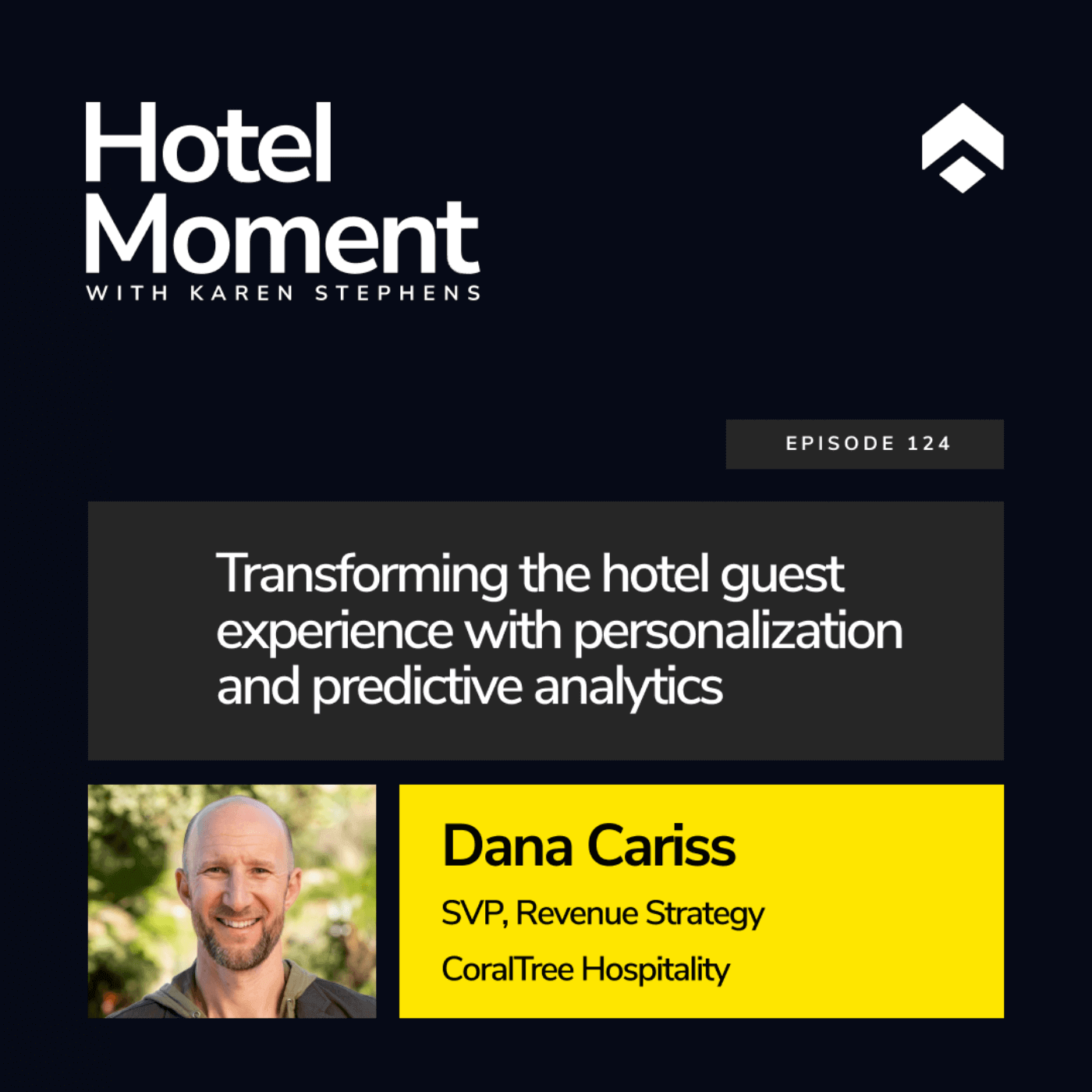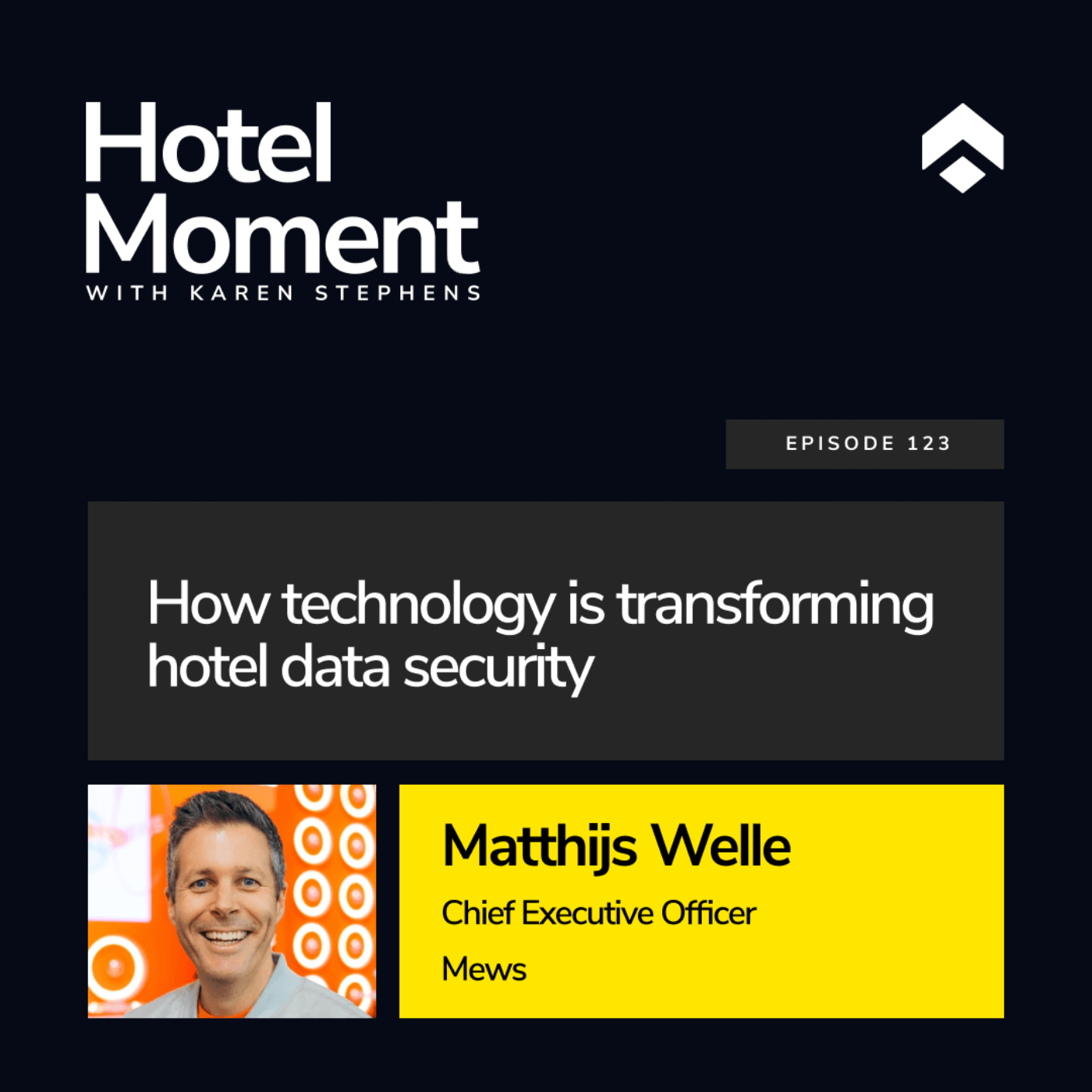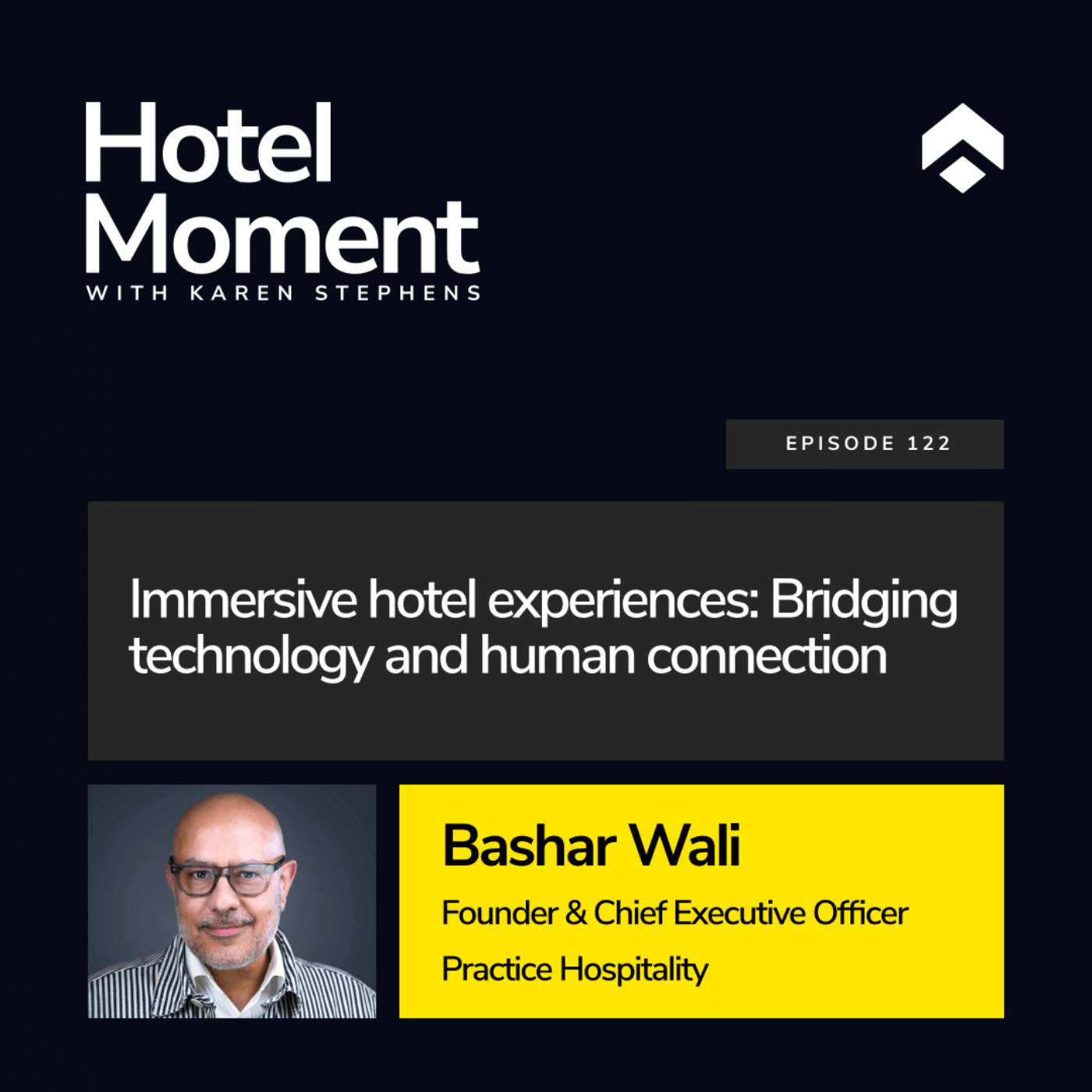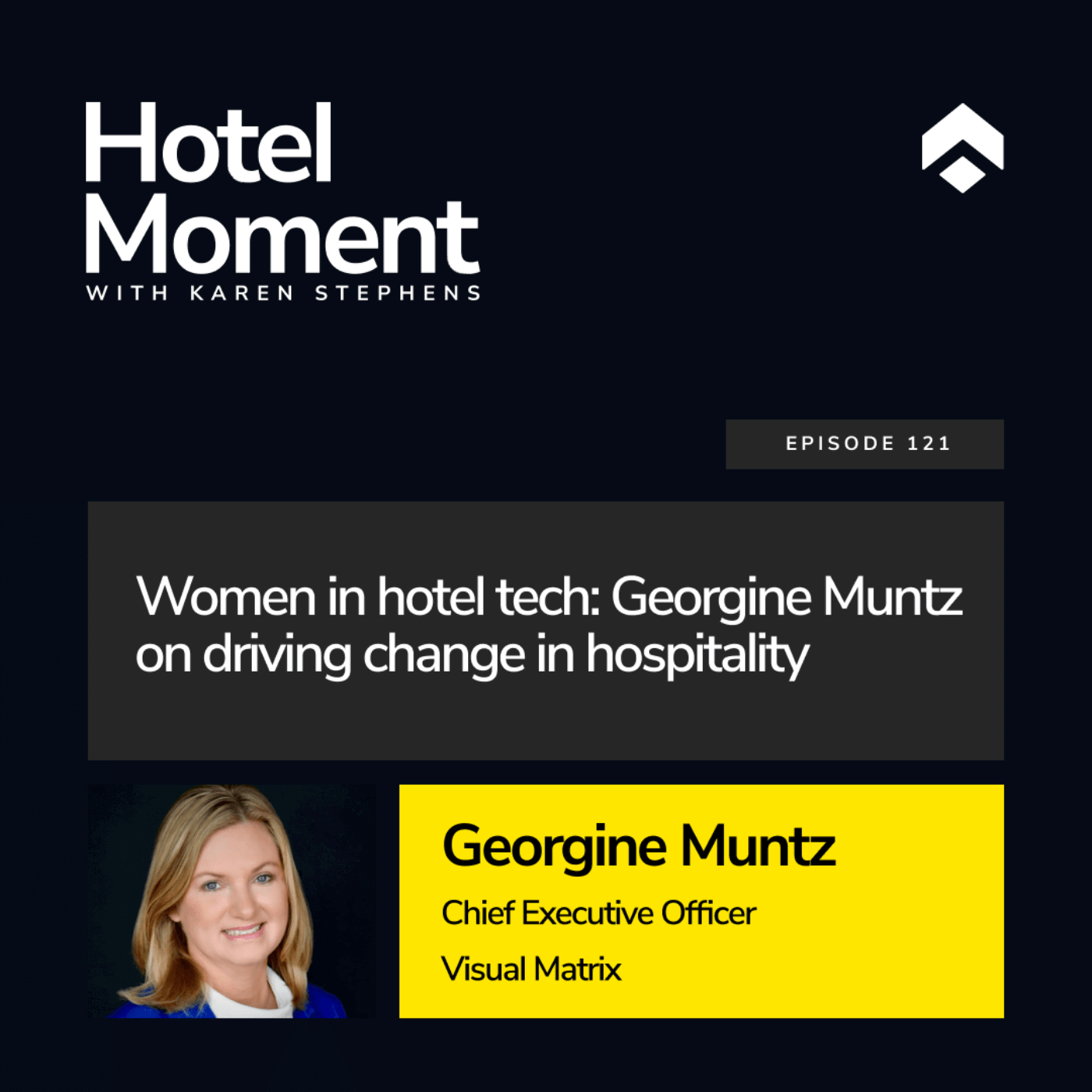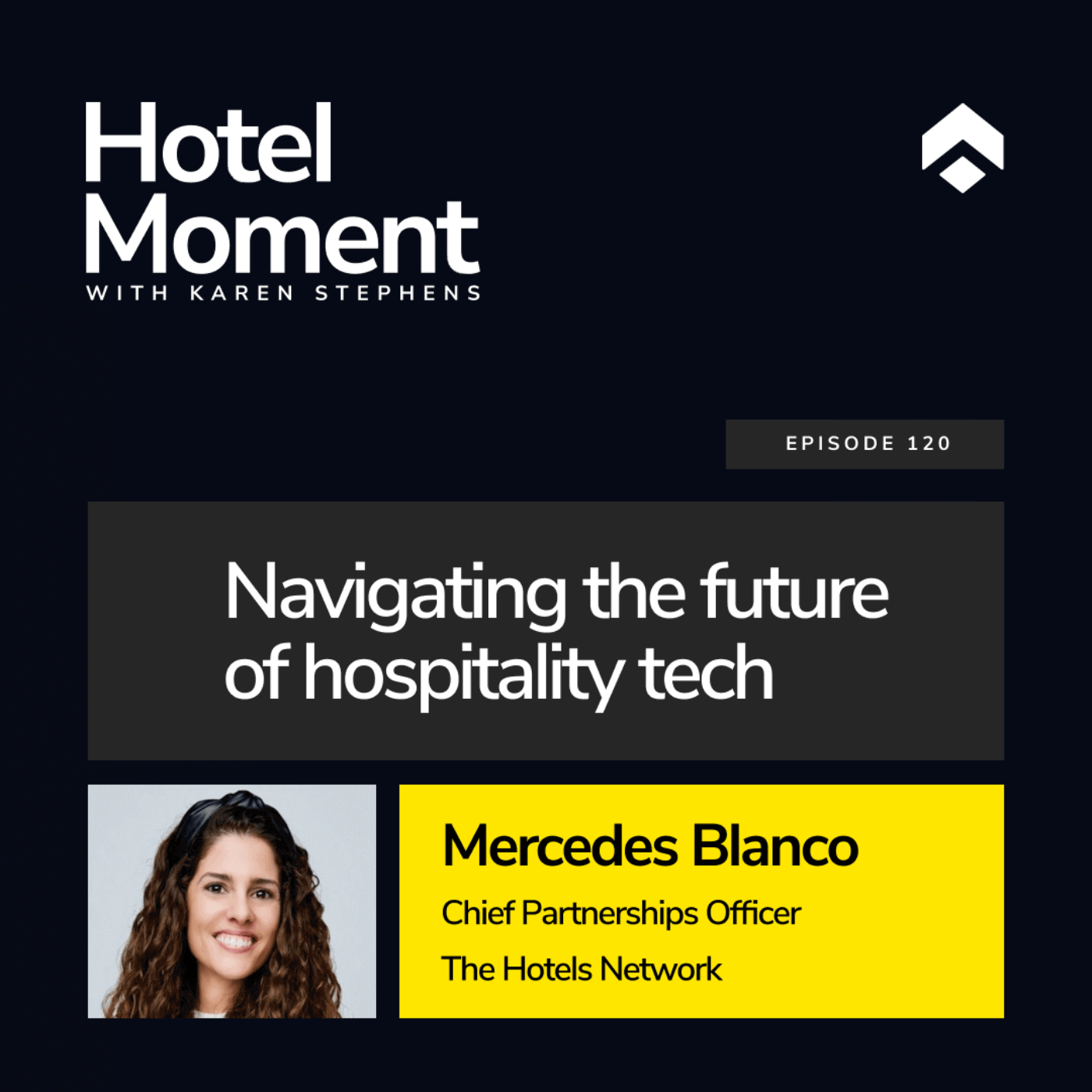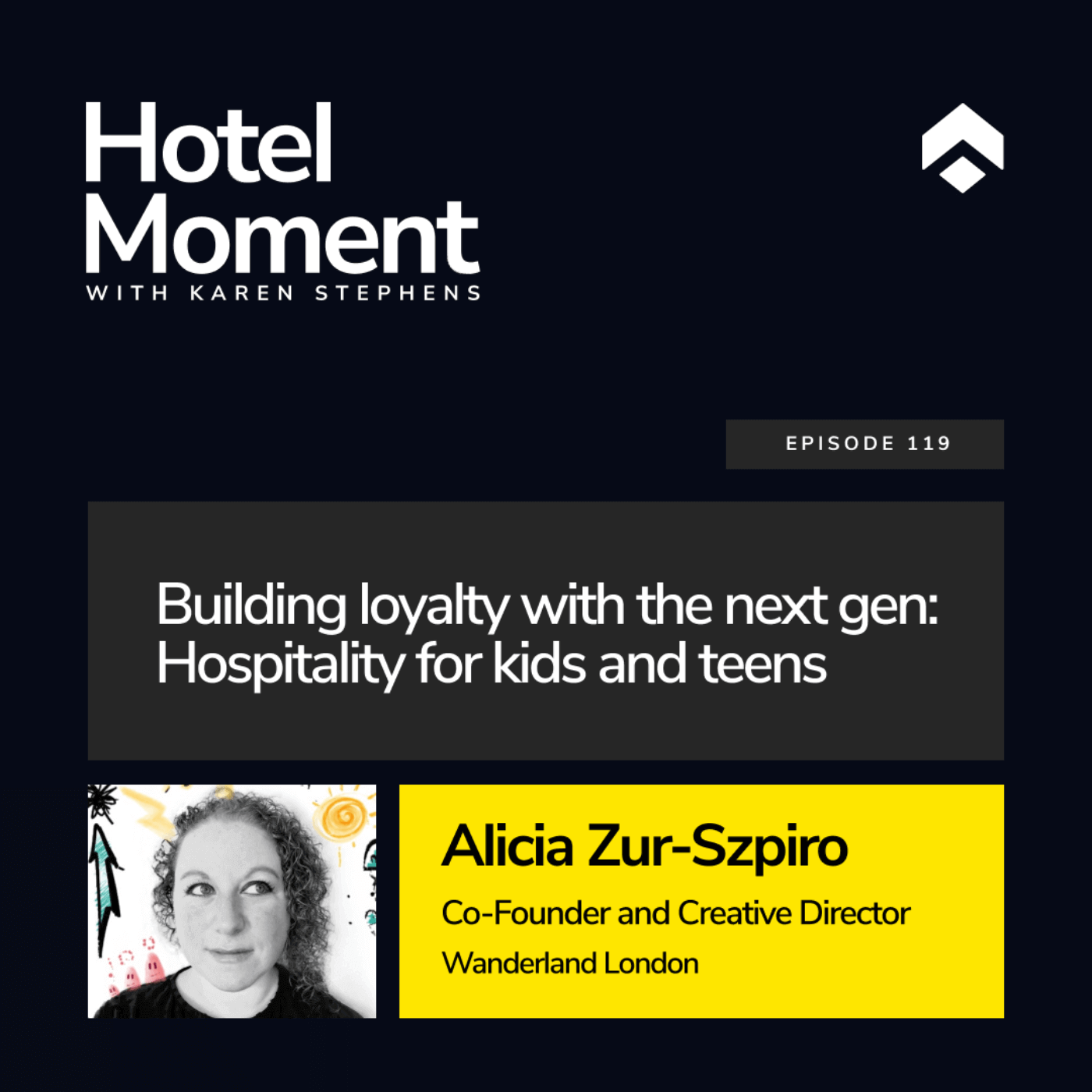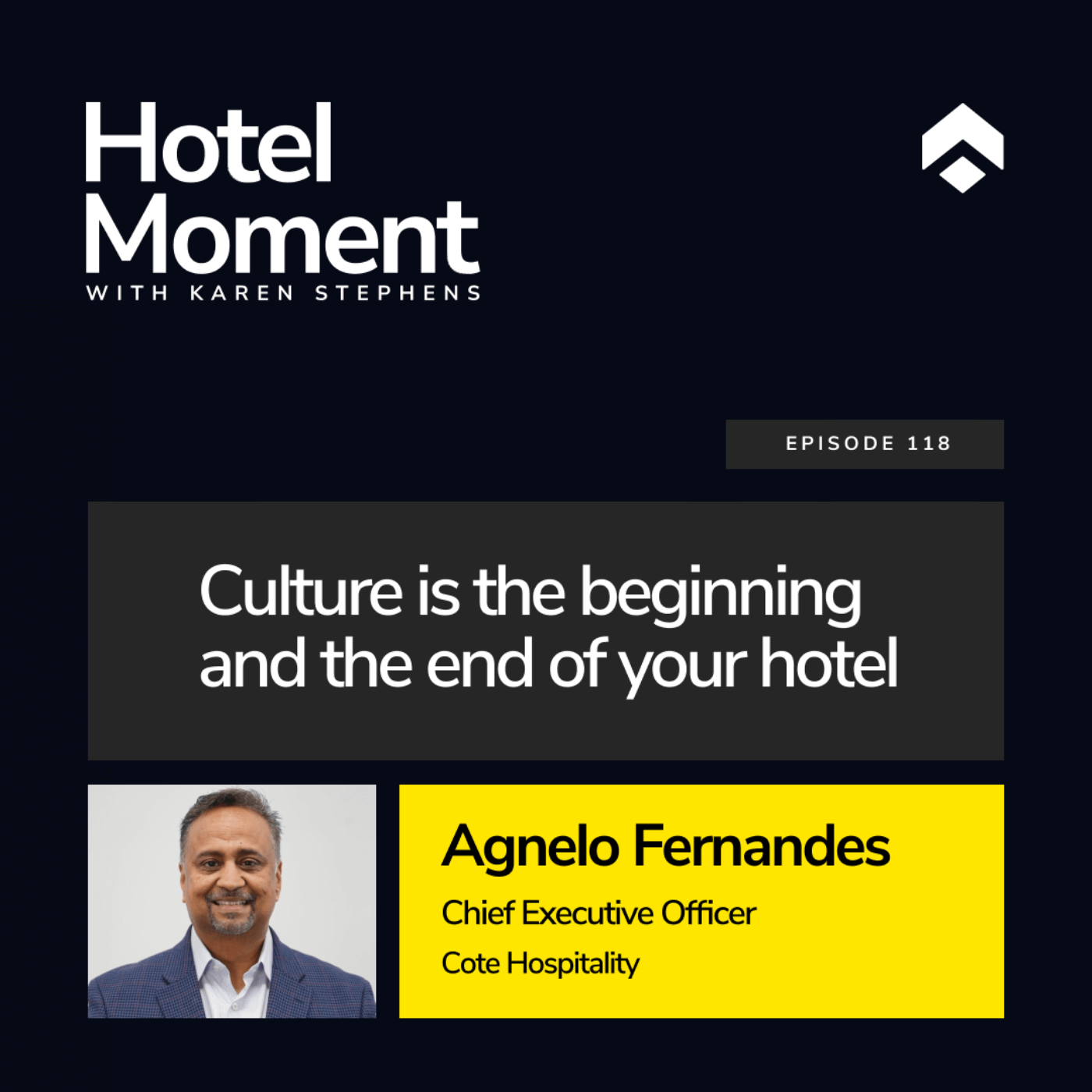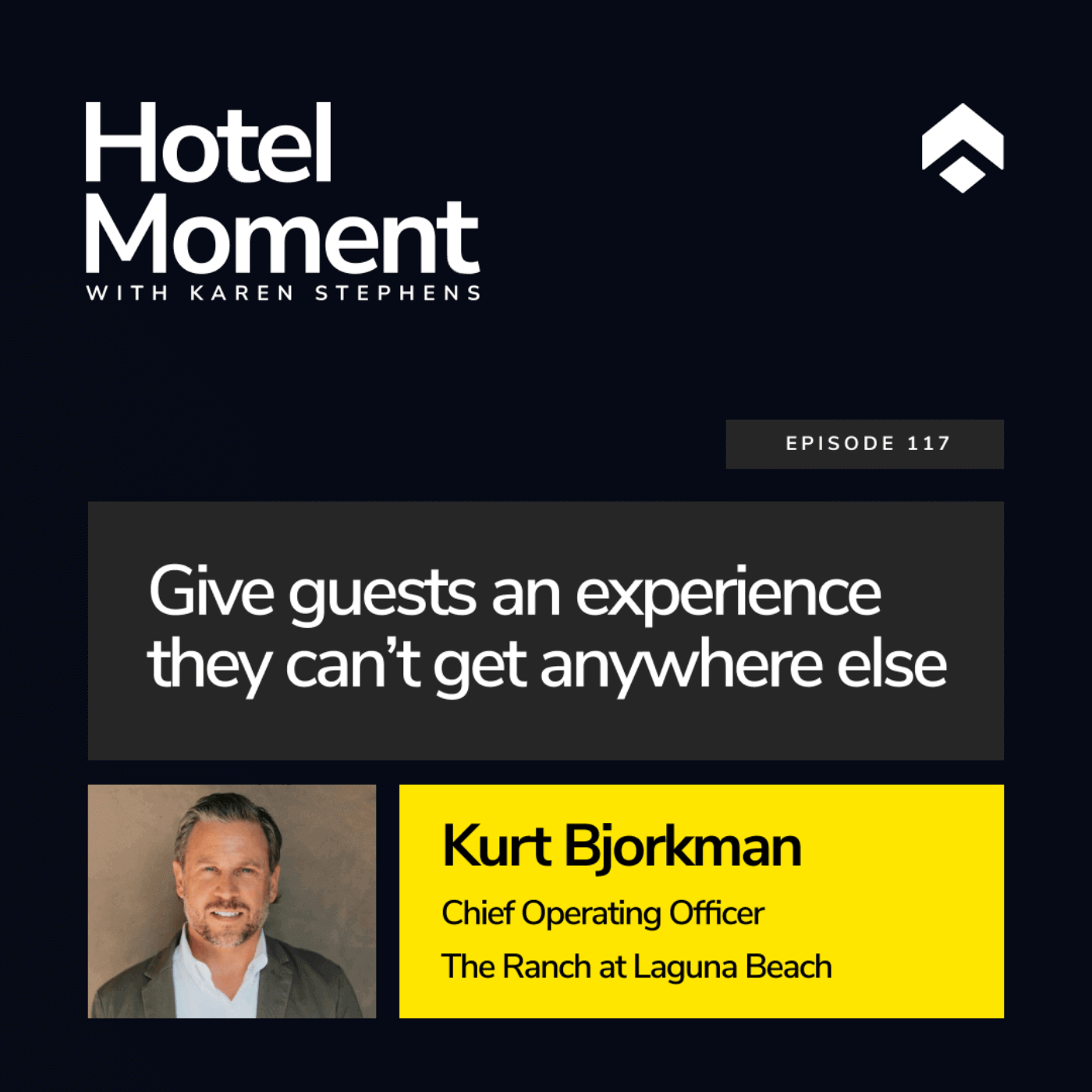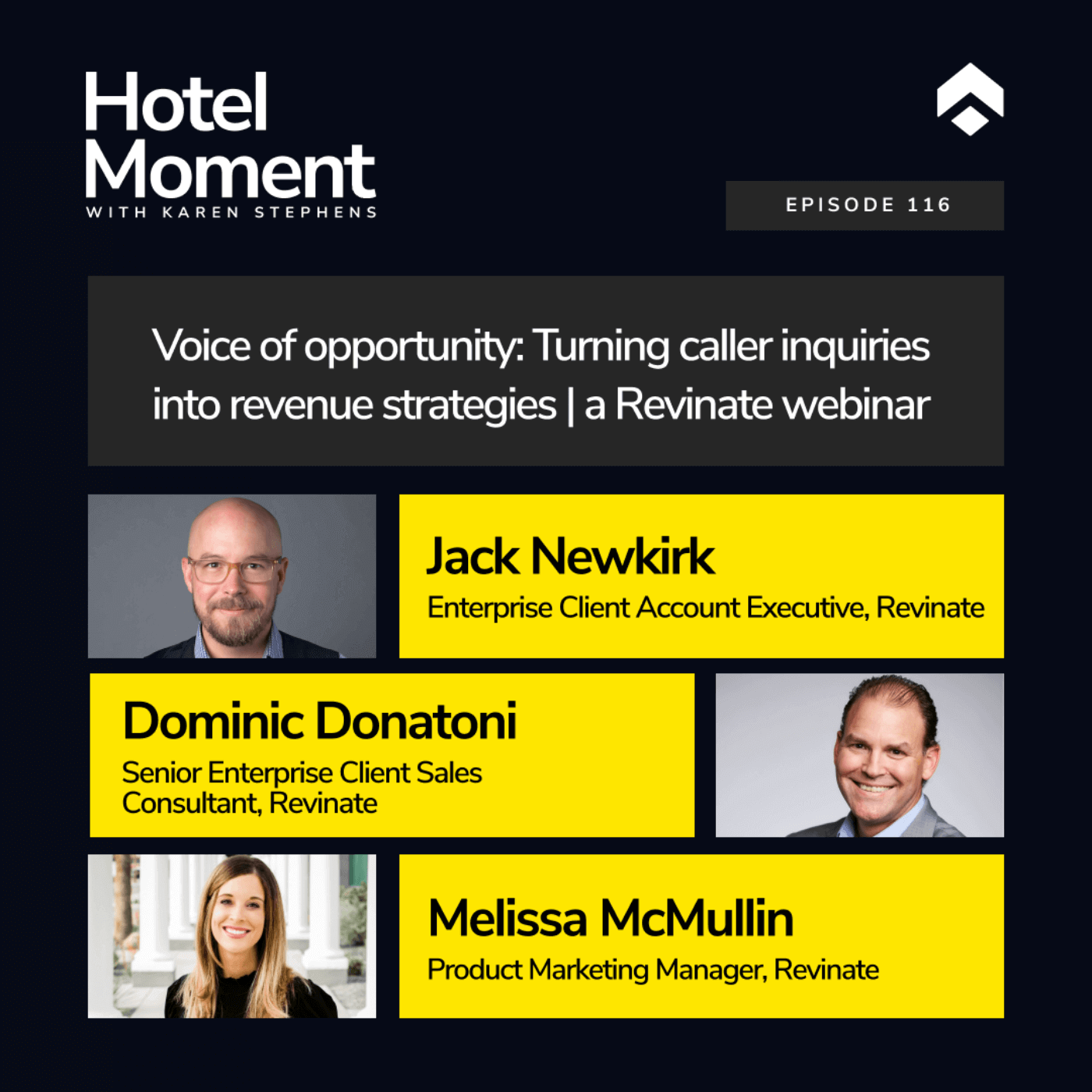Hotel Moment
WITH KAREN STEPHENS


Episode 121
Women in hotel tech: Georgine Muntz on driving change in hospitality
In this week’s episode of Hotel Moment, Georgine Muntz, CEO of Visual Matrix, joins Revinate CMO Karen Stephens with advice for hoteliers and women in hotel tech. Georgine gives practical examples of how to prioritize healthy data management practices while explaining how women can push hotel technology to solve real-world problems inside hotels today.
Stable, reliable, and integrated tech systems are what Georgine believes deliver hoteliers and their staff the data they need to connect with guests and build relationships. And Georgine believes that women can be champions of the technological innovation hoteliers need to achieve these types of tech systems that work for hotels, and not against them.
Tune in and discover an eye-opening approach to how you can extract the most value out of their technology as a hotelier — and how women in hotel tech can be drivers of change.
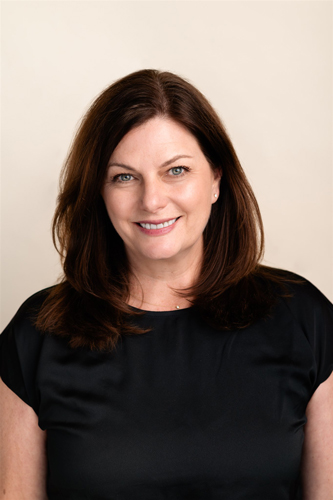
Meet your host
As Chief Marketing Officer at Revinate, Karen Stephens is focused on driving long-term growth by building Revinate’s brand equity, product marketing, and customer acquisition strategies. Her deep connections with hospitality industry leaders play a key role in crafting strategic partnerships.
Karen is also the host of The Hotel Moment Podcast, where she interviews top players in the hospitality industry. Karen has been with Revinate for over 11 years, leading Revinate’s global GTM teams. Her most recent transition was from Chief Revenue Officer, where she led the team in their highest booking quarter to date in Q4 2023.
Karen has more than 25 years of expertise in global hospitality technology and online distribution — including managing global accounts in travel and hospitality organizations such as Travelocity and lastminute.com
Watch the video
Transcript
Georgine Muntz – 00:00:00: I want to see hotels get to a place where technology works for them and not against them, and they have ways to prevent these terrible things that are going on like crimes. And then lastly, from a women’s perspective, I’d like to see more women in that C title and a CEO title.
Intro – 00:00:21: Welcome to the Hotel Moment podcast presented by Revinate, the podcast where we discuss how hotel technology shapes every moment of the hotelier’s experience. Tune in as we explore the cutting edge technology transforming the hospitality industry and hear from experts and visionaries shaping the future of guest experiences. Whether you’re a hotelier or a tech enthusiast, you’re in the right place. Let’s dive in and discover how we can elevate the art of hospitality together.
Karen Stephens – 00:00:51: Hello, and welcome to the Hotel Moment podcast. I am your host, Karen Stephens, the Chief Marketing Officer of Revinate. And today we are thrilled to have Georgine Muntz, the CEO of Visual Matrix, joining us. Georgine has nearly two decades of experience in technology and now is the CEO of a property management system. She is at the forefront of helping hoteliers streamline their operations and innovate on their tech stack. At Visual Matrix, she is leading the charge on creating tech that enhances decision-making and boosts operational efficiency while ensuring that tech integration remains seamless and beneficial. She is passionate about empowering businesses with the tools they need to succeed and has a unique focus on using tech to tackle social issues such as human trafficking within the hospitality industry. We’re excited to dive into her insights on hospitality technology and innovation. So Georgine is a powerhouse in the industry. I’m really delighted to have her on the program. What we’re going to get into here is not only what her company, Visual Matrix, is doing to innovate in hospitality, but also how she has grown throughout her career to be a CEO now of a company and also serving on several boards. And we’ll also touch on something near and dear to my heart, which is the Women’s Innovation Council. So stay tuned for that. And with that, I give you Georgine. Welcome to the podcast, Georgine.
Georgine Muntz – 00:02:12: Hi, Karen. Thanks for having me.
Karen Stephens – 00:02:14: You know what? I am delighted to have you. We’re recording this in March, and this is the finale to our series for Women’s Month. So to have a powerhouse like you on, for me, is a great pleasure. So thank you for doing this.
Georgine Muntz – 00:02:25: Thank you.
Karen Stephens – 00:02:26: So, Georgine, you’ve worked across several industries, blending technology with business strategy. How does your experience in these diverse fields inform your approach to hospitality technology?
Georgine Muntz – 00:02:37: That is a really good question. I was just thinking before I jumped on here that I feel like most of my career has led me here. And I’ll explain that a little bit more. I started my career as an accountant and then quickly realized that that was not my thing. It was a little bit too repetitive and boring, but I did get into accounting technology. So got a real deep understanding of financial technology that led me 20 years into my career into co-founding a company in auto finance with a colleague of mine. That company was called Defy Solutions. So I got to really learn how a company works and how technology helps a company benefit from its services. So that kind of built a foundation. And then building and growing my own company was great experience for what I’m doing now in hospitality, which is growing and building a property management system, serving thousands of hoteliers. So I feel like learning all of those basics, even though they weren’t in hospitality, were the pieces that needed to come together to make helping hospitality get out of what I think many of us believe is a lagging position in the technology space. I feel like hospitality is maybe about 10 years behind. And part of my career was helping auto finance and banking systems get caught up with technology. So here I am four years, almost five years into the hospitality space, and able to leverage all that experience to try to help us get off of the on-prem technology that we’re used to, the very poorly integrated technology that hoteliers have been living with, to a much more integrated, cloud-based, and technology-forward solution. So for me, it’s super exciting.
Karen Stephens – 00:04:31: One thing you hit on there that I want to make sure that our listeners really keyed into is that you started with a finance background. And I’m not saying that everybody should go out there and get degrees in finance, but I think it’s really important if you’re going to come up through the ranks, whether in hospitality or any other discipline, you have to understand how to talk about numbers and you have to understand how those things drive business. So I just wanted to make sure we pulled that through.
Georgine Muntz – 00:04:57: A hundred percent. And that’s one of the questions we talked about prior to this is what advice do you give to women coming up? And that’s one of the key things, like learn the business, learn the numbers, learn how a company makes money and loses money, because that’s extremely important.
Karen Stephens – 00:05:12: Yeah, that’s great. So shifting back now to hospitality and technology, because I want to pick up on, you know, you’re now the CEO of Visual Matrix. You’re the CEO of Visual Matrix. You’re the CEO of Visual Matrix. You’re the CEO of Visual Matrix. You’ve been in that position since 2020. So one of the major challenges that the hospitality industry faces in dealing with data silos and poor systems integration and lagging technology is that we are about 10 years behind. So how do you address this issue at Visual Matrix and what’s the impact of resolving data silos for hotels?
Georgine Muntz – 00:05:40: So a couple of the things we did right away was when I joined the company, most of our customers were still in on-premise solutions. So we quickly, created a strategy and a process that would enable them to go from their on-prem PMS system to the cloud. With us that took an hour. And so they really did nothing. They simply stopped using their system for about an hour. We ran the process to get their data into the cloud to make sure all the systems were working and get them up and running. That’s thing one, because when you’re living in an on-premise system, especially a PMS system, integrating and taking on new technology is extremely difficult. You have to go point to point, get that data to and from that location. And of course, we have thousands of locations. So we quickly moved most of our base to the cloud. We still have a few stragglers that were moving along. That was thing one. And then thing two is we adopted the Express PMS standard that was out there, HTNG created it. And so with that, we put our CTO on that committee, and we adopted it, and we then used it. Instead of just saying we’re on the committee and we’re going to support this standard, we did it, and we integrated our own housekeeping and maintenance system, which we call MOP, with that Express PMS integration tool. So our thought was if we could create and support standards and hospitality, then any technology, new technology could come in, with, of course, the proper security protocols come in and integrate so that our customers would have the advantage of that. And we were able to use that. There was an up-and-coming company that was doing tipping because people don’t carry cash anymore. And they were able to integrate with our PMS in a couple of days versus what might traditionally be months of integration and testing.
Karen Stephens – 00:07:33: I think that’s another interesting point that you make. In this environment now, it’s so important to have APIs and be able to integrate with different technology partners. So I think especially as a property management system, you’re literally the heart and soul of a hotel, right? You’re the center of it. And if you take the approach that, no, no, we’re going to do everything for you, you don’t need to work with any other vendors on anything, you’ll quickly be outdated. So can you talk a little bit about how you feel about open APIs and why that’s important?
Georgine Muntz – 00:08:03: Absolutely. Primarily to help get us out of that hole, because we couldn’t as a PMS company, and I don’t think any PMS company could build fast enough to catch up with all of the innovation that’s going on. So if you’re cClosing your system, and not having that, and I wouldn’t call it open APIs because of the high-security situation that we need to live in today, but having standard APIs that you can offer to these other potential technology providers in the space. So that was one piece of getting us out of that laggard position. The other piece of it, though, the technology, the integration is one key piece, and it needs to be done well. But the other thing is you have to have relationships with these other providers. It’s not just pay me, I’ll integrate or do this. We need to have a long-term relationship because our customers, as you guys all know, real-time, all the time, 24/7. We have to have stable, reliable systems integrated so that the data that, especially at the front desk, the front desk needs at the moment of check-in and check-out is available for them. Because that improves the guest experience tremendously and makes the entire hotel stay easier for everyone.
Karen Stephens – 00:09:18: Absolutely. So you’re right. It’s on the technology providers to partner well together, secure the data, make sure the data is available. And then for hoteliers, they can do what they do best, which is guest experience.
Georgine Muntz – 00:09:29: Yeah. And one of the reasons we took this relationship-based approach is one, it’s my nature, and my team is bought in on that. But the other thing is what we heard, we did some roundtables in the industry pretty quickly because I was trying to go up to speed as fast as I could in this space. We had a roundtable, at one of the conferences and heard from a cross-section of the industry. Their biggest complaint was finger-pointing. And so the PMS is typically the system that someone calls. If there’s any problem at the property, they’re going to call us first, even if it might be a payment processor problem or a CRS problem with their reservations coming in. They call us and what they were getting in the traditional format was, “Oh, that’s not us, that’s them.” And we wanted to solve that problem. So we thought, if this is the number one problem of our customers, we can solve this. And we need to do that by creating not just the good integration that’s reliable and secure, but also the relationship. So when they do call us, instead of us saying, “Oh, you need to call your payment processor”, we say, “We’re going to get that payment processor on the phone because we have a direct relationship and connection with their tier two support team who knows us and knows how our system works.” And so what we were able to do after a couple of years of really establishing these relationships integrations was get to a point where last year, 98% of our inbound issues were resolved without any referral to another provider, which we take tremendous pride in and our customers hugely value.
Karen Stephens – 00:11:04: Wow. I can imagine they do because I think being able to provide that customer service. And also, I think the other thing you mentioned is roundtables. Really listening to what’s going on out there. It brings to mind something else. It’s not necessarily customer feedback, but you have a council. I want to talk a little bit about the Women’s Innovation Council. So in addition to being the CEO, you’re very active in a lot of other things. So I want to touch on some of that. So let’s start with the Women’s Innovation Council. What is it?
Georgine Muntz – 00:11:33: Yes, that was born, again, this like desire to, I kept asking people, especially people who have been in the industry a long time, why is hospitality so far behind? Why aren’t they innovating and grabbing this new technology that’s cheap and readily available to help their business? And I would get all kinds of different answers. But finally, one of my industry advisors and friends, Michael Frankel, said, Georgine, let’s try to solve this. Let’s get together and create a council of, and we picked women, not primarily because I am a woman, but also because we were seeing at the conferences and on panels and roundtables, it was mostly men. And the women’s voices weren’t getting heard. So I thought, well, if we got here with this type of input from the industry players that we have, which we absolutely need — all these experienced men’s voices — if we got here with this type of structure, let’s see if we can’t accelerate innovation again by bringing in different voices from not just like all PMS or all hoteliers, but cross-section, technology providers, women who are on the hospitality side, owning hotels, managing hotels, technology providers doing all different types of things in the industry. So we thought, let’s bring this group, broaden the spectrum, focus on women just so we can get an unheard voice to the table, and then try to come up with ways that not as necessarily as a group, we work on the same things, but we really inspire each other to innovate.
Karen Stephens – 00:13:02: Yeah, I absolutely love that. And I think, you know, again, no shade to the men.
Georgine Muntz – 00:13:07: In fact, we invite them to our meetings, and Michael’s the co-founder of this council and is definitely not a woman.
Karen Stephens – 00:13:13: We’re not saying no to them, right? But I think what’s interesting there — I mean, certainly I’ve also been in technology for a long time — and I think in any company you so many women who are so capable and rise to high positions, but often they are drowned out. The other thing that was interesting about when I was doing some research for this podcast was just really realizing how many boards you sit on. So I think that you really are an exception. You’ve kind of come up, you’re a C-level officer, not just a C-level, the CEO, and you’re on several different boards. So can you just talk, what advice would you give to women out there who are looking to grow their careers on how to expand their footprint in that way?
Georgine Muntz – 00:13:51: Yeah, it took me probably mid-career or maybe even a little bit later to realize that part of the problem or part of the reason women weren’t in the C-levels, the CEO levels and the board levels was because women were leaving the workforce once they got to a comfortable position, either from their goals or title or financially. And I could easily have left when I exited and sold my company that I co-founded. I could have found a way to retire and left, but I very intentionally said, “I can’t do that because then I’d be a hypocrite.” Because I was in my earlier years of my career, kind of always been a little bit of a rebel asking these women, “Why are you leaving? Why aren’t you at least getting on a board of this company that you spent 20 years and you made it to the executive or even the C-level at?” And they would say, “Well, I want to go spend time with my grandchildren. I want to do this or that.” And I realized like, if we don’t stop doing that, then we only have ourselves to blame for not being able to bring women up to that level, and not giving them examples of where to be. So knowing that I kind of had this mission to get onto boards and bring women up into the higher levels in business and technology, I intentionally made sure that I was available to get on boards. And I did that in a variety of ways, working with innovators and especially women innovators. I took some of my money that I was going to invest, and rather than put it in stocks and bonds, I put it into emerging, especially female-founded technology companies so that I could not only help them get to where they were going, but encourage that, so that was some of the boards that I’m on, like Shoptelligence is one of those. And then I also just networked with my non-female founder network and ended up realizing that I could offer a lot of influence there. So if I’m on a board, I might be the only female on the board, I can help influence them to be more diverse in the types of people they’re choosing. So I think for women who are still yet mid-career, start thinking about and looking into what it is that people on board’s value. And we talked a little bit about it already. They value a real business orientation, and operational and financial orientation towards solving problems and growing businesses. So make sure that when you’re early in your career, take an opportunity to be an operations, to get into finance, to find a way to get more experience, while you’re younger. So that when you get to that chance, where you have the experience and knowledge to join a board, you have the right skill sets or the valuable skill sets there. And you can even take classes. I think there’s many classes that are even free now. But I went back and got my MBA because early in my career, I was working for a big airline. I realized that they were paying people doing a job that was the same or even less valuable to the company, double what they were paying me as an accountant because these people had their finance or their MBA. And so I just went back, got it, and made that happen. So figure out what things it’s going to take to be on the board. So you want to be on someday and start working on that as early as you can.
Karen Stephens – 00:17:12: That’s a great piece of advice. Another way I’ve also had leaders on this podcast talk about investing in your own brand. And I feel like that’s part of it. It’s like, how do you make the investment in your own skill set, not just for the job you’re in, but for what you aspire to be someday? And I think what’s really great about boards is that. It really is being able to give advice to the operators of the business, but you’re coming in with the experience to give that advice and not necessarily be in the grind.
Georgine Muntz – 00:17:40: Yes, exactly. It’s a really different perspective. But having been in the grind really helps you give that advice.
Karen Stephens – 00:17:47: Right. You have to be in the grind first.
Georgine Muntz – 00:17:49: Yep.
Karen Stephens – 00:17:52: Well, I wanted to shift gears again and talk about another project that you work on. So this is a project that focuses on the fight against human trafficking in hotels. So another way to help, I’m guessing, mostly women, not necessarily, but can you share a little bit about that project?
Georgine Muntz – 00:18:08: So I was really oblivious to trafficking, and especially how it was impacting hospitality owners and businesses. But the Women’s Innovation Council kind of was the underlying factor there. We were talking about innovation, and how we can innovate. And it occurred to me, and also my Chief Marketing Officer that we have the technology that could help identify, and ideally help prevent or reduce the amount of trafficking going on in hotels. And of course, that’s the PMS. Most hotels have a check-in process, and they see what’s going on at the front desk, and we’re there for that. And then also our housekeeping and maintenance tool is in the hand of every housekeeper walking into a room and seeing whatever they see. So we thought it wouldn’t be that difficult for us to put a few pieces together to make that easy for hotels. Because right now, and AHLA and many other organizations have been trying to prevent this, but they’ve really been focused on education, which is important and absolutely the first step. But nobody that we saw, and we started thinking about it and asking around, we didn’t find any technology that was helping resolve this problem. And we thought, well, “We’re technologists. We’re women. We want to innovate.” This is a place where we can do it and not only help hoteliers, because you’ve seen — and I think there was even a new lawsuit today — millions and millions of dollars being lost in lawsuits related to trafficking. Even though hoteliers absolutely don’t typically want this business, they just don’t have a way to stop it because it’s dangerous. Like, you don’t want to put your hotel staff in front of somebody who’s a criminal, and have them try to prevent this activity. So we thought, well, we can do this behind the scenes. And as soon as we started thinking like that, I started networking and saying it out loud, just putting it out in the world. And you would be amazed at how many people have now come in and said, “We get it. We want to help too. We’re doing this. We’re doing that.” And in that process, I found a couple of companies. One is called Darkwatch, and they’re aggregating data around these criminal activities. So one of our goals is to integrate there with their data, and send even more data to them so that when we see suspicious activity in a room or at the front desk, our team members using our system can safely document what they saw and say, “I saw something suspicious. This happened.” And send that in. And then it can be matched with other data like known names, phone numbers, and emails of these criminals. So we started thinking, we can do more if we think bigger. And it kind of came from this, how can we innovate? What’s new under the sun? Because a PMS needs to do all the things a hotel needs to do. It’s very much a standard that has to be a certain way. But if we add these other benefits, not only will we bring in technology solutions, but maybe we can help solve a massive crime problem that’s going on, right under our noses.
Karen Stephens – 00:21:10: I think that’s an excellent application of the technology for the good. So just looking forward now, I mean, obviously, this is interesting times for the industry. We’ve got a lot going on. So the world has a lot going on. But how do you see things evolving kind of in the next, call it, three to five years with technology at the hotel and the role of the PMS in that evolution?
Georgine Muntz – 00:21:31: When I was kind of catching up and trying to figure out strategically where this industry was, I saw all these articles about the end of the PMS. Everything was going to be about customer relationship management and not the PMS. And I laughed a little bit because we’re still on-prem. So we’re definitely not in this place where we’re merging into the cloud in a whole different format. I think in three to five years, we’ll still, unfortunately, be trying to get the last of our hoteliers on-prem, getting them securely in the cloud, and helping them understand that they don’t need all of these mandates, and hard integrations. That they can open up their technology to options so that when you offer options, you get a lot more investment in this space. Right now, I feel like we’ve blocked out a lot of interest and investment because we’re very, one, on-prem, and not easy to integrate with. And two, stuck in these mandate worlds. So I think over the next three to five years. We’ll get less on-prem, which will give us more cloud opportunity, better integration opportunity. And I also think we’ll see less of these mandates, especially around PMS in the U.S., where they’re really stringent. So you see that a lot of the big brands are moving to newer technology, cloud-based. And that, I think, will continue. But what I’ve noticed is things move very slowly. So I don’t think it’s going to be rapid, but I think it’s going to be progress. And maybe instead of 50-50, where we probably are now with on-prem and cloud, it’ll be more 80-20. And that gives us a lot more opportunity for new technology and innovation.
Karen Stephens – 00:23:10: So last question for you. With the work you’re doing now, what do you hope to achieve personally in the next five years? Or what would you like to see change for hotels? But I’d love to hear, you know, again, I feel like closing out Women’s Month to have a leader like you is a great honor. So what are you thinking for yourself in the next few years?
Georgine Muntz – 00:23:29: For myself? I want to see some of these things come to reality. Because right now, they’re still mostly ideas, although we’ve made some progress, we’ve changed up some things, we have some things already in the technology in the works, but I’d want to see them in action in the hotels. And then I want to see hotel owners less constricted, and have more ability to pick tools to run their business that makes sense for them. So if I can see those things like really happening, and not just being a wish or an idea, I would feel extremely gratified in the work that we’ve done, even though we won’t do it ourselves. There’s a lot of players just being able to kind of be the thorn in the side and get some things moving is going to be extremely exciting for me. I had a chance to do a very similar thing in auto finance. Everything used to be a fax. And if you’ve ever gone in and bought a car, and filled out that credit application, it used to be paper. And they used to take that paper and fax it to lenders. There were millions of faxes going around. You think of the trees, and the waste, and all of that going on. And we were able in that industry to move them online into a system that was all electronic and secure. So I got to see, and now today, if you asked a 20-something-year-old to fax in their credit app, they would look at you like you’re from Mars. So I got to see that industry go from really paper-based to fully cloud-based and much more efficient. And better for the car dealers, which is the people doing it. I want to see the same thing with hotels. I want to see hotels get to a place where technology works for them, and not against them. And they have ways to prevent these terrible things that are going on like crimes. And then lastly, from a women’s perspective, I’d like to see more women in that C title and a CEO title. Right now, if you look around, hospitality, especially at the big franchises in the U.S., you see, unless I’ve missed someone, I don’t see any CEOs in those positions. And I don’t even see more than half or even close to half of the C titles being women. So I’d like to see a little progress there as well.
Karen Stephens – 00:25:41: Right. Absolutely. I’m going to give a shout-out to Shannon Knapp, who’s the CEO of Leading Hotels of the World, which is obviously a marketing affiliation, not a brand, but that’s the only person that comes to mind for me.
Georgine Muntz – 00:25:51: We’ve got to start in bits and keep pushing. So I’d love to see that.
Karen Stephens – 00:25:55: That’s great. Thank you so much, Georgine. It’s been a pleasure to have you on the show.
Georgine Muntz – 00:25:58: I’ve enjoyed it. Appreciate it. Have a good day.
Outro – 00:26:06: Thank you for joining us on this episode of Hotel Moment by Revinate. Our community of hoteliers is growing every week, and each guest we speak to is tackling industry challenges with the innovation and flexibility that our industry demands. If you enjoyed today’s episode, don’t forget to subscribe, rate, and leave a review. And if you’re listening on YouTube, please like the video and subscribe for more content. For more information, head to revinate.com/hotelmomentpodcast. Until next time, keep innovating.
Hotel Moment
WITH KAREN STEPHENS


Be the first to know when a new episode drops
This site is protected by reCAPTCHA and the Google Privacy Policy and Terms of Service apply. View our Terms & Conditions here. *Required fields.

